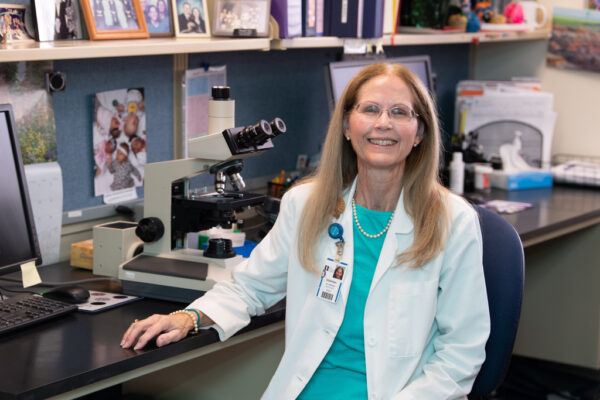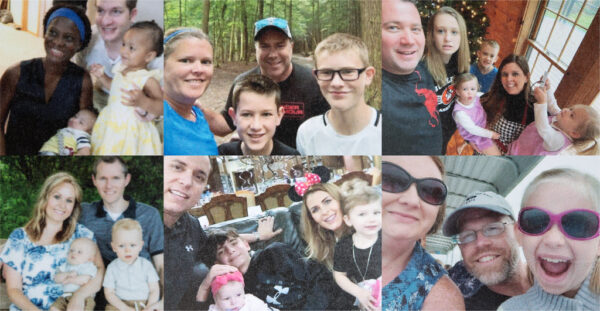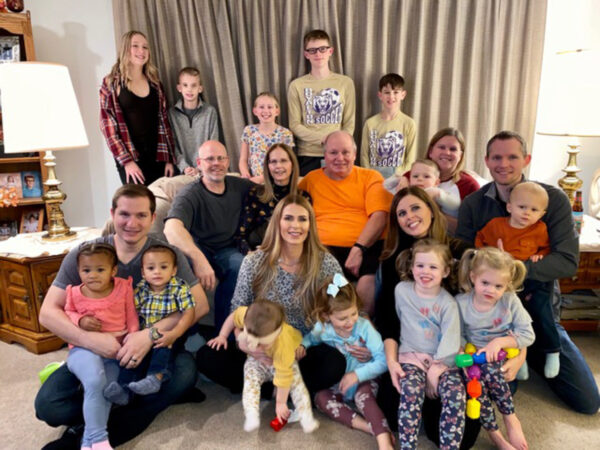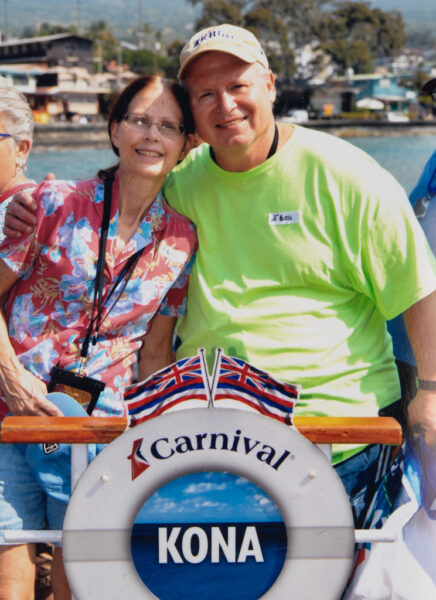
Debbie Tulodzieski, medical technologist in the cytogenetics laboratory, retires on December 31 after 41 years at Akron Children’s.
Science has always fascinated Debbie Tulodzieski, medical technologist in Akron Children’s cytogenetics laboratory. As a child, she read science books non-stop, pondering the careers available to a girl who loved science and math. Since Debbie feared heights, becoming an astronaut was out. Nursing was another option until she heard a news report about nurses parachuting into flooded disaster areas to aid victims. At that time, she panicked because she didn’t know how to swim.
But Debbie’s love of science remained, eventually leading her into medical technology. Working behind the scenes in the hospital’s laboratories, Debbie is one of Children’s skilled scientists performing tests and providing data that clinicians use to diagnosis and treat patients.
After 41 years at Children’s, Debbie retires on December 31. She plans to enjoy time with her husband, family and grandchildren, work on gardening and house projects, watch sci-fi movies and sports, help her mom out and go on cruises when the pandemic ends.

Debbie Tulodzieski’s children are Justin, Jessica, Jacqueline, Matthew, Christopher and Caitlin. Many of Debbie’s kids volunteered and did rotations at or earned scholarships from Children’s. In this composite, they are shown with their families.
What brought you to Children’s?
I lived out of town and was home visiting my family. I was close to earning my bachelor’s degree in medical technology and planned to move back to Akron once I did. I called Akron Children’s and was able to get an interview. Clair Jaberg, former laboratory manager, and Mark Watson, former laboratory administrative director and later, chief operating officer, hired me.
Have you always worked in the same department and role?
I’ve always been a medical technologist in Children’s pathology and laboratory medicine department, beginning in the centralized core laboratories on the afternoon shift. Since there were fewer staff during that shift, I was able to work in all the areas of the laboratory, performing tests in hematology, chemistry, the blood bank, immunology and microbiology. After 5 ½ years, I applied for and got a job on day shift in cytogenetics as a technologist. In this role, I analyze and test chromosomes found in biological specimens, such as amniotic fluids, bone marrow and blood. Over the years, the types of tests we do and equipment we use have become more complex and precise. Two examples are chromosomal microarray analysis, which probes separate chromosomal regions to detect cytogenetic imbalances, and fluorescence in situ hybridization (FISH), which allows us to detect and locate a specific DNA location on a chromosome. These tests enable us to get answers faster so our patients can start their treatment sooner.
What have your biggest contributions been while here?
Years ago, I noticed that fetal specimens might sit all weekend before they were tested. This could affect their viability. I helped to implement a new medium to preserve and protect them. Another contribution has been ordering supplies for my department for 30-plus years. It has always required some juggling to account for storage space, especially for refrigerated or frozen reagents, order the right quantities and manage product expiration dates. Lately, we’ve been impacted by supply chain issues, making it challenging to get and keep an adequate supply of items to ensure we run smoothly.
What gave you the most satisfaction at work?
At times, cytogenetics can feel as if you’re looking for a needle in a haystack. Whenever I finally find the one cell that confirms the patient’s diagnosis, it’s satisfying to know that treatment can begin promptly. And sometimes, if we get follow-up specimens, it’s nice to see that the patient is in remission.

All of Debbie Tulodzieski’s children and their families live in northeast Ohio. Debbie and her husband, Dan (middle row, second and third from left), look forward to many family gatherings.
What’s your most memorable and/or happiest moment at Akron Children’s?
I met my husband, Dan, at Children’s. He worked here for nearly 30 years. Through our experiences here, we’ve provided for and supported our 6 children, many of whom volunteered and did rotations at or earned scholarships from Children’s. We’re proud parents of a medical technologist, teacher, 2 nurses and 2 physicians.
What’s your idea of a perfect day?
Laying on the beach with the sun in the sky and a light breeze or taking a hike in the woods.
Do you have any advice for people just starting at Children’s?
This is a great hospital system to work for with good programs, benefits and incentives. I’ve worked with some people for several decades, which is a testament to the culture at Children’s.

Debbie Tulodzieski and her husband, Dan, who also worked at Akron Children’s in the pathology and laboratory medicine department, look forward to going on more cruises when the pandemic is over.
What couldn’t you live without?
Chocolate, coconut, pineapple and Almond Joy coffee creamer.
What music do you like? Where and how do you listen to it?
I like listening to classical, 70s rock and The Beatles on the radio or compact discs.










